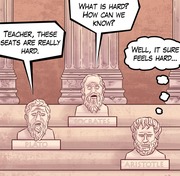|
Home
|
Jun 10, 2019
This week’s themePeople who have had multiple words coined after them This week’s words Socratic method Midas touch philippic herm Achilles' heel 
Cartoon: Reginald Graham/Wikimedia Previous week’s theme Weird plurals A.Word.A.Day
with Anu GargThe Nobel Prize is overrated. Obama appointed Steven Chu, a Nobel laureate in physics, as his energy secretary. Trump’s energy secretary Rick Perry won the “The Top Cowboy of Texas” award. Who do you think would be more energetic,* someone who whiled his energy away in getting a physics PhD, or someone who frolicked on the stage in Dancing with the Stars? I know what some of you are thinking. How about two Nobel Prizes? OK, Marie Curie won two Nobel Prizes, but let’s keep things in perspective. How many Twitter followers did she have? Zero! Compare that to Madam Kardashian who has millions. Some of you are mumbling to yourselves: Curie’s family, her husband, their daughter, and son-in-law, they all were Nobel Prize winners. That’s nice, but did you know every member of the Kardashian clan has millions of Twitter followers each? So what objective criterion can we use to determine who is more influential?** How about this: how many words have been coined after a person? Having just one word coined after someone is rare, how about two? This week we’ll see eponyms, words coined after people. Each of the five people featured in this week’s A.Word.A.Day has had multiple words coined after them. We’ll revisit these same people next week to see other words coined after them.
*Seriously though, the US Government’s Department of Energy is the department
(read, ministry) that oversees the nuclear weapons program and energy research,
among other responsibilities. Also, a secretary around here is not someone
who cranks out letters on a typewriter, but is in a post equivalent to a minister
in other forms of government.
**To be more precise: who is more influential on the English language vocabulary. Socratic method
PRONUNCIATION:
MEANING:
noun:
A method of teaching in which, instead of giving the answer, the teacher
guides students to it by asking them a series of questions.
ETYMOLOGY:
After Greek philosopher Socrates (c. 470-399 BCE) who employed this method
in his teaching. Earliest documented use: 1741. Socrates’s wife Xanthippe
has also given us an eponym.
USAGE:
“‘I wait for no more than -- how many minutes?’ she asks, dipping into
the Socratic method. ‘Seven,’ the room answers in unison.” Janelle Nanos; Joanne Chang Won’t Rest Until Everything Is Perfect; Boston Globe (Massachusetts); Nov 29, 2015. See more usage examples of Socratic method in Vocabulary.com’s dictionary. A THOUGHT FOR TODAY:
A great deal of intelligence can be invested in ignorance when the need for
illusion is deep. -Saul Bellow, writer, Nobel laureate (10 Jun 1915-2005)
|
|
Subscriber Services
Awards | Stats | Links | Privacy Policy
Contribute | Advertise
Awards | Stats | Links | Privacy Policy
Contribute | Advertise
© 1994-2025 Wordsmith